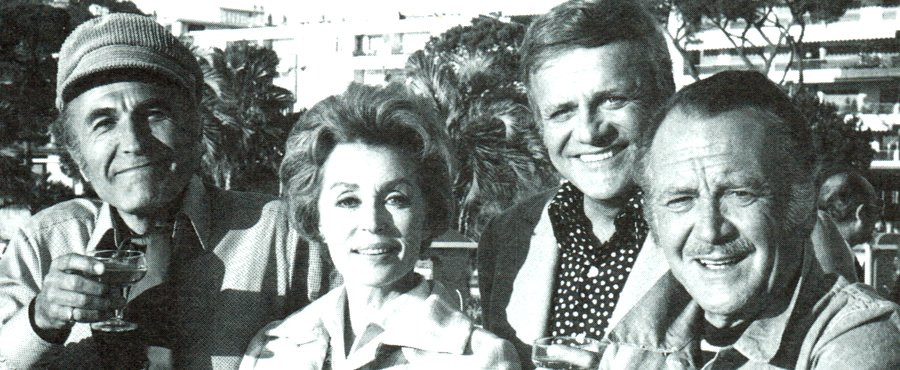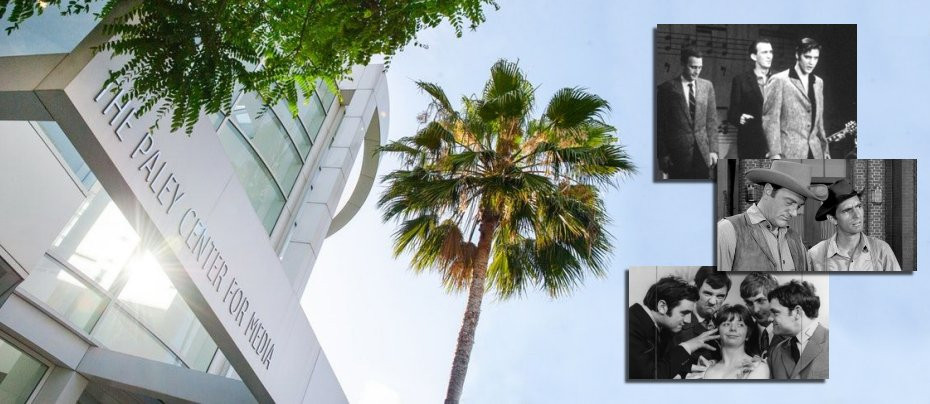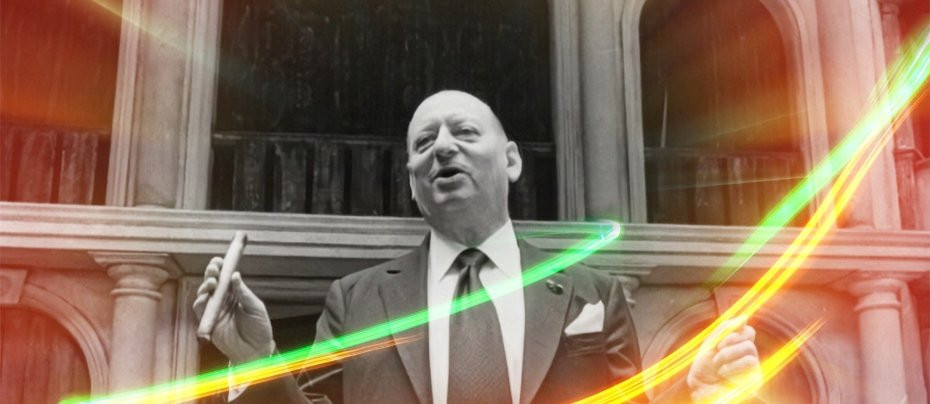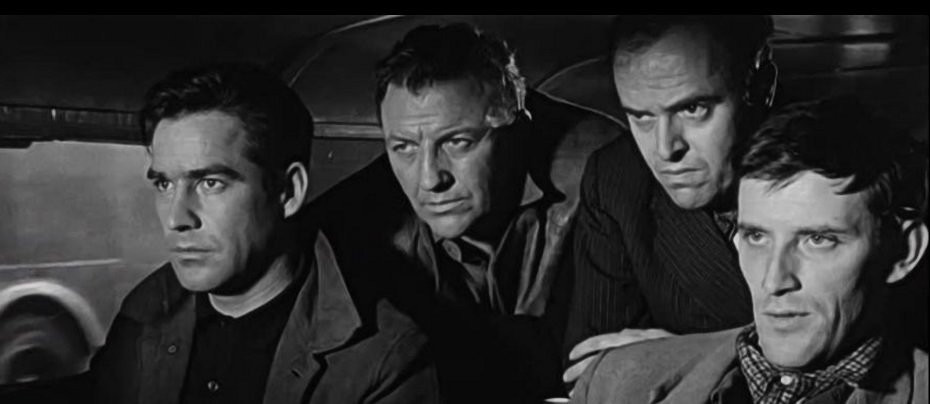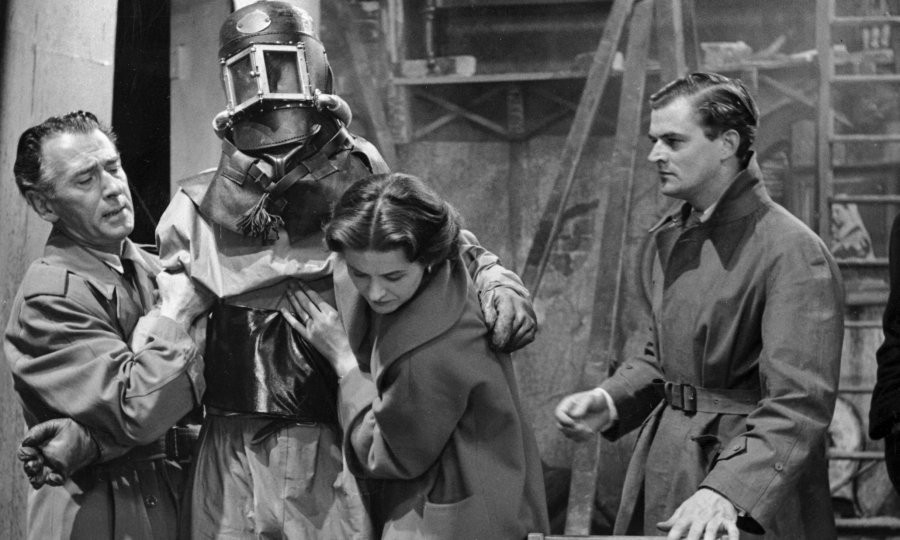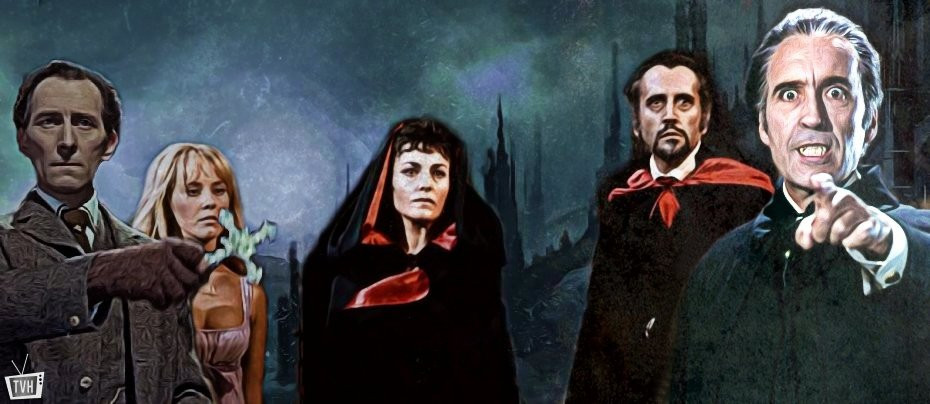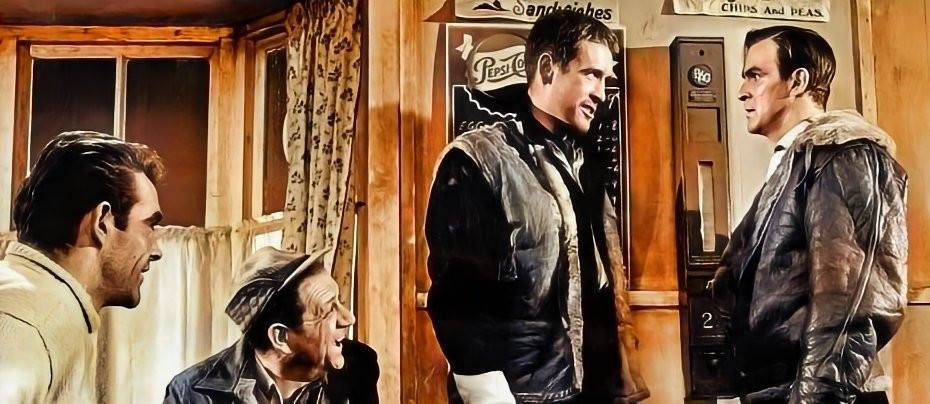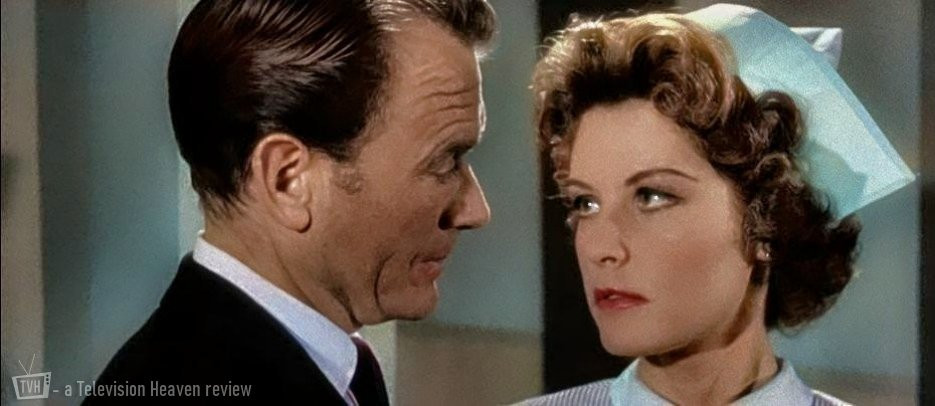
Starring Barbara Bates
You know how it is. You go your whole life without ever hearing of an actor or actress and then, thanks to the TV schedulers, two films featuring the previously unheard-of performer appear on screen in quick succession. In this case, the previously unheard-of artist is Barbara Bates, an American actress who didn’t have much luck. That's as good a reason as any to review Town on Trial and Apache Territory, both of which were shown a while back on Film4. In Town on Trial, Ms Bates has John Mills as her co-star. I have been a fan of his (and Sylvia Syms, albeit for different reasons) since watching Ice Cold in Alex on the BBC one Sunday afternoon when I was a kid.
Town on Trial was made in 1957 and was directed by John Guillermin. It concerns what lies beneath the respectable surface of the residents of Oakley Park, a quiet town somewhere in the Home Counties, following the murder of a local girl. The type of town we're dealing with is revealed at the start when the main protagonists are shown driving past a sign that states 'No accidents please'. It doesn't take too much imagination to picture the person who painted this sign wagging his finger as he did so.

Mr Mills plays Detective Superintendent Mike Halloran, called in from London to solve the crime. With its urgent opening shot of a police car discharging a handcuffed suspect and the police rifling through the suspect's coat pockets, the film wants to be a tough US-style thriller. This would explain the unusual casting of American stars Charles Coburn and Barbara Bates and John Mills's sporadic, and ultimately unwise, adoption of an American twang. It's fair to say that his accent in this film sometimes leaves much to be desired. The producers should have gone the whole hog and recruited a visiting American actor to play a tough New York cop, over here to show the Limeys how it’s done.
Still, if Mr Mills had played it a l’Anglaise we would have been denied the pleasure of listening to him recite a suspect’s statement early on in the proceedings. 'I walked alarng the high sdreed. Id was deserded', he recounts to a police typist who deserves a promotion to Chief Constable for keeping a straight face.
His trusty sidekick, Detective Sergeant Beale tries to half-heartedly muscle in on his American action by announcing to Halloran at one stage 'Here's the dope from the air ministry'. Delivered by solid English character actor Harry Locke wearing a sports jacket, a cravat and a fedora, the line doesn't quite work and nor does the film's attempts to be something it isn't. Let's look at the evidence: the action takes place in the Home Counties, John Mills is as English as walking into a red phone box and dialling 999 in an emergency, and the police drive those lovely black Wolseley cars with bells on. This is England of a certain vintage and that’s a fact. If you take it from here, sojourn past Railway Cuttings and on beyond the blue lamp, you’ll still find it tantalisingly out of reach because it’s a place there’s no going back to.
The murder victim is Molly Stevens, strangled by a nylon stocking late one night. Played by Magda Miller, she is first seen playing a game of doubles at Oakley Park tennis club wearing an outfit that, if worn today by the ladies during Wimbledon fortnight, would certainly make this viewer pay more attention while they pootle through the sets.

There are suspects galore in the murder of Miss Stevens because she was a game girl. Disappointingly, no one uses the phrase 'no better than she ought to be' but her murder would have had most of the male members of the club very worried indeed. A fruity girl, then, with no shortage of male admirers or female detractors and it is no surprise when the pathologist announces to Halloran that she was two months pregnant when she died. Raymond Huntley must have had an afternoon free because he puts in a fleeting appearance as the said pathologist.
While searching through Molly's belongings, the police find a Biblical quote on a piece of paper referring to Ahola playing the harlot and being slain with a sword because of it. At the moment, this quote seems a bit woolly and out of focus but remember it because it'll come in useful later on.
The chief suspect for the murder is Mike Roper, the tennis club secretary who is linked to Molly by his school scarf, from Harrow no less, found by the police at her flat. The fact that he was the one who got her pregnant doesn’t help his position much, either. Played by Derek Farr, Roper walks the tightrope of respectability, outwardly successful but furiously juggling this with affairs, blackmail and possibly murder. It’s the first time I’ve seen Mr Farr but he does outstanding work here. Roper's claims that he was a Wing Commander during the war are soon demolished by Supt Halloran who learns, courtesy of Sgt Beale, that he rose no higher than an RAF sergeant who was discharged after helping himself to the mess funds. He is also overdrawn at the bank and has debts at every store in town. Why I'd like to bet the cad didn't even go to Harrow, either
Solid Charles Coburn plays Dr John Fenner, a Canadian doctor with something to hide and this could well be the fact that he is the murderer. He has brought with him Nurse Elizabeth Fenner, his niece.
The other main suspect is Peter Crowley. Played by Alec McCowen, he is an unstable boy bullied by his mother, played by a terrifying Fay Compton. The victim of a short-lived affair with Molly he becomes a person of interest after the police discover a volume of Rupert Brooke’s poetry that he had given to Molly as a present.
Supt Halloran is, of course, a maverick who is not afraid to stand on anyone's toes. Being an old-fashioned policeman, Halloran likes his corruption up front because there is less digging to do. He is appalled at the goings on of Oakley Park and wants nothing more than to tear down its cloak of respectability.
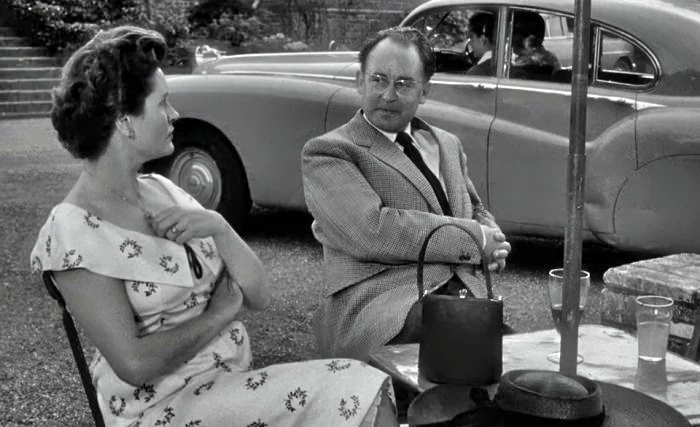
Charles Dixon, a local bigwig played with his usual forcefulness by Geoffrey Keen, takes exception to his attitude and attempts to pull strings to have Halloran thrown off the case. There's a lovely resulting cameo from Newton Blick as Assistant Commissioner Beckett, speeding in from the big city to warn Halloran to watch his step. I love the way Beckett steps out of the car outside the police station and pauses to survey the surroundings. It is a gesture of which Commander Gideon of Scotland Yard would have been proud.
Regardless of being warned off by his superior, Halloran is an outsider who would like to invite some of the town's residents, particularly Messrs Roper and Dixon, outside with him so that he can give them a damn good thrashing.
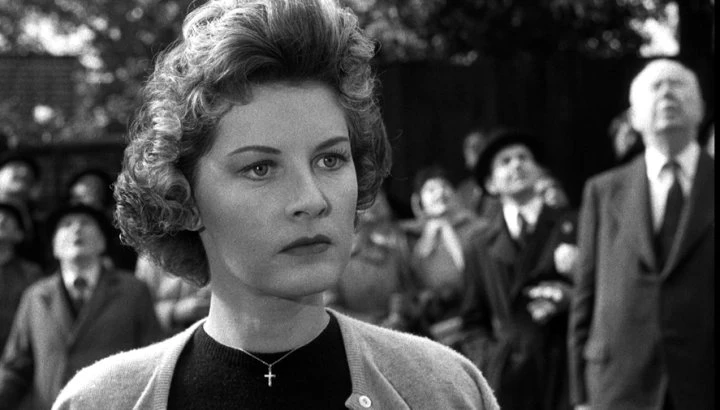
Played by lost soul Barbara Bates, Elizabeth Fenner is also an outsider and this probably explains the strange attraction between the two. The viewer knows Halloran is keen on her because he doesn't give the poor woman room to breathe. He sticks to her like a piece of plaster, as Morecambe and Wise used to sing and, if he were to try such a tactic nowadays, he would be had up on a charge of police harassment.
There is minimal chemistry in Halloran's relationship with Nurse Fenner, not helped by an age gap which looks every one of its twenty-odd years. Nurse Fenner is a bit of a blank canvas but perhaps she is just annoyed at being dragged across the Atlantic, to a grey and alien land, by her Uncle John. The highlight of her involvement in the proceedings is when she threatens to make a chicken salad for her Uncle (and I dread to think what she would put in it).

Halloran's relationship with Nurse Fenner helps to show that he is not some sad loner who spends his off-duty hours in sinister thoughts about an unbilled Dandy Nichols masquerading as his landlady. It also highlights the gulf in values between Halloran and the town. While its citizens are enjoying a midsummer ball at the tennis club, he is at the pub with Nurse Fenner having a jolly old game of darts and being upfront with all and sundry. Darts is a frustrating game but it teaches you a lot about life. The only time you're going to hit a double twenty is when you're aiming for a double one and if that's not life then I don't know what is.
This is followed by a funny encounter with the local bobby who takes exception to Halloran tooting a car horn after 11pm and ignores the reek of alcohol surrounding his superior. There's a good scene too at the boating lake where Halloran, worn out by rowing, is gently advised by the good nurse that it may be easier if he doesn't row against the current. He is too experienced a policeman not to understand her meaning but, being the loose cannon that he is, he is determined to see the case through to the end, and if that means catching a few crabs along the way then so be it.
Outwardly the head of the most respectable family in town, Dixon's big problem is his daughter Fiona. She likes a good time, was a friend of Molly’s and, as Dixon sees it, threatens to stain the family linen with her involvement with such a trollop. After the shame of Fiona being brought home by Halloran, fresh from her involvement in a drunken car accident outside an unsavoury den called the Hot Spot, Dixon threatens to send her away to the country to straighten her out. Good country air and jodhpur wearing would sort anyone out.
Fiona is played by Elizabeth Seal, another of whom I was ignorant until Inspector Google's enquiries revealed that she was a song and dance merchant, and a skilful and lithe one at that, operating in the 1950s and 1960s. This would explain the splendid dance that Fiona carries off at the Midsummer Night's ball at the tennis club. Billed as Fiona's Mambo in the opening credits, it's a confident and sexy expression of individuality designed to attract attention and drive her father mad. Sadly, Fiona pays for her freedom of expression by becoming the murderer's second victim, strangled with a nylon stocking in the grounds of the tennis club. The quote about Ahola playing the harlot is also found in Fiona's handbag which shows that there is a serial killer on the loose with a dislike of women and a knowledge of obscure biblical quotes.
Mark Roper's problems are brought to a head when he is ridiculed at the ball by Harry Fowler as possibly the sliest, and least convincing, bandleader ever. Roper's wife has had enough of the ridicule and disowns him, leaving him with nothing better to do than get more drunk and go into bankruptcy.
After an impromptu spelling bee with the main suspects, Halloran deduces who the murderer is. There be no spoilers here so I'll say only that he manages to get a confession out of the murderer while both are perched precariously on top of a church spire. Thankfully, they are brought down to earth by the ever-dependable fire brigade, using one of those extendable ladders that everyone should have a go on at least once before they die.
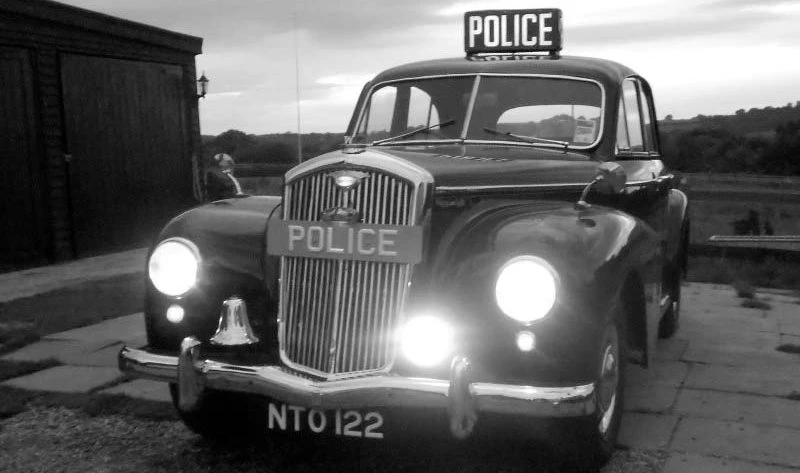
At the end, the precarious love affair between Halloran and Nurse Fenner is left unresolved. There's an unconvincing declaration from Halloran that he will be back to see her but the last we see of him is when he is speeding back to the smoke in his police car. He is off to deal with a 999 call from a Mr Dickie Valentine who rang to complain that someone broke into his heart and stole a beat or two. An arrest is expected soon. Ish. And if, dear reader, that breaking news leaves you unmoved then I would respectfully suggest that this article may not be for you.
Barbara Bates is a bit more animated in Apache Territory, possibly because her love interest in this is Hollywood bad boy Rory Calhoun and not some strange Englishman in a raincoat who invites her back to his digs for cheese and mustard sandwiches. The film is based on the novel Last Stand at Papago Well by my dad’s favourite author, Louis L’Amour.
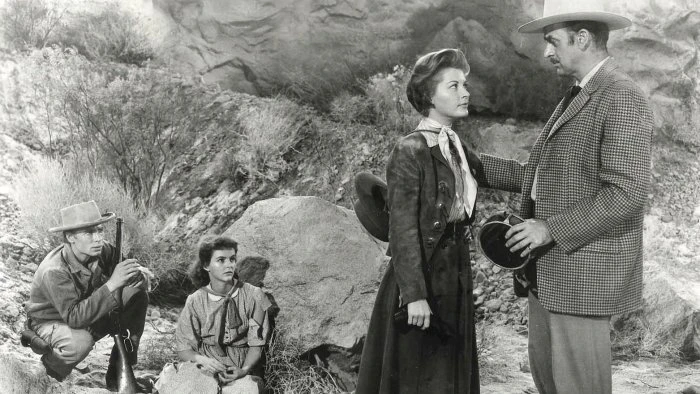
Made in 1958 and directed by Ray Nazarro, Apache Territory stars Rory Calhoun as Logan Cates. He is a wandering loner on his way to Yuma who makes it his mission to save a disparate band of cavalry soldiers and civilians from marauding Apaches, whether they like it or not. He must have missed the 3.10, which is just as well as its most recent passengers aren't a patch on Glenn Ford and Van Heflin.
Ms Bates plays Jennifer, a young lady with whom Cates has history. Currently affianced to an older man played by John Dehner, she spends most of the film trying to resist the passion that still smoulders between her and Cates. To keep the younger viewer interested there is also a simmering, but chaste, love affair between a couple of young’uns played by Tom Pittman and Carolyn Craig. Just to show that not all indigenous Americans are bad people, their band is joined by Lugo, a friendly Indian scouting for gold.
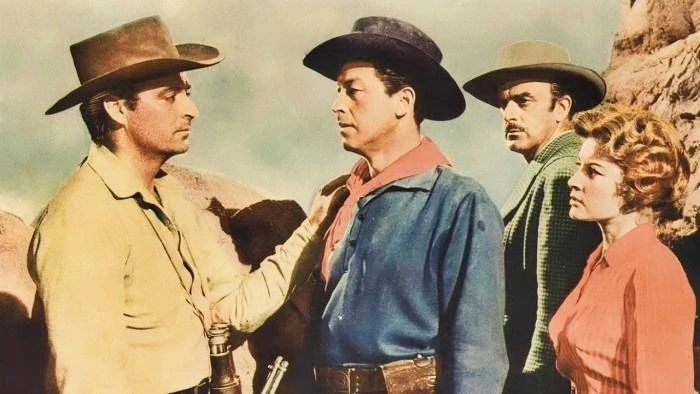
The cavalry includes tough Leo Gordon, as Trooper Zimmerman, a disaffected soldier desperate to escape the Apaches and Cates's authority. There is the obligatory fight scene in which Calhoun’s fists get the better of Gordon. This is suspending disbelief a little too far because every fight fan knows that, in a bout between the two, ex-armed robber Gordon would have kicked Calhoun’s saddlebags all the way to Yuma and back again. Calhoun no doubt viewed his victory as one of the perks of being the film’s producer and star.
There is a good cameo from Myron Healey as the trooper who goes stir crazy and breaks cover to face the Apaches, only to be captured and tortured by them. The scene in which his plaintive cries echo coyote-like over the nocturnal desert is hard to forget. In the end, John Dehner shows himself to be the duplicitous coward that the viewer knew all along he would turn out to be and attempts to make a getaway on his own, leaving his fiancée to the tender mercies of the blood thirsty Ai-patch. A bullet in the stomach soon puts him right, though, courtesy of Lugo, the friendly Native American.
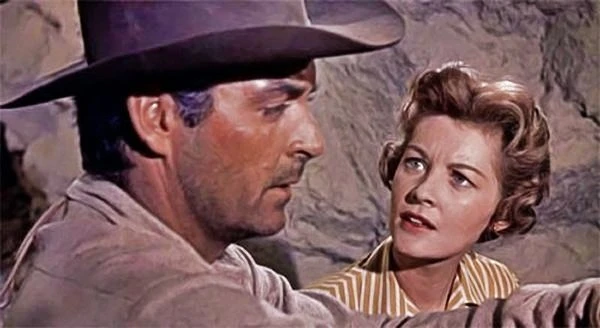
Calhoun gets the better of the Apaches by filling canteens with gunpowder and using them as Molotov cocktails to blow the troublesome varmints to smithereens. This must be the most innovative and imaginative method of dispatching Red Indians, sorry, Native Americans, of any tribal denomination, ever committed to celluloid. The cavalry troops can return to the fort and the love-struck young’uns are now free to pursue happiness in California, thanks to Lugo’s generous donation of a few chunks of gold. Of course, after their brush with death, Logan and Jennifer realise that they were made for each other and they ride off into the sunset, doing their best to avoid the dead bodies as they go.
I don’t know much about Rory Calhoun but I think he must have been a decent chap. In a more altruistic example of producer’s perks, he secured the role for Barbara Bates in this film, at a time when her career was on the wane and she was suffering from mental illness. She had recently attempted to resurrect her career in England, leading to her appearance in Town on Trial, but this was not a success. Sometimes good friends aren’t enough and she met a self-willed end in 1969 through carbon monoxide poisoning. She was 43.
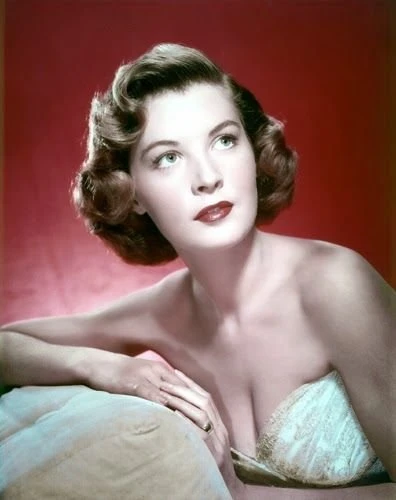
Town on Trial and Apache Territory are two likable films, with nothing in common except that they were both made by Columbia Pictures and starred Barbara Bates. They are shown quite often on Film4, TCM or Talking Pictures so if you get the chance to watch either of them, you should put aside your iPhone, direct your satnav towards the TV and do so.
Published on October 23rd, 2022. Written by Andrew Coby for Television Heaven.


